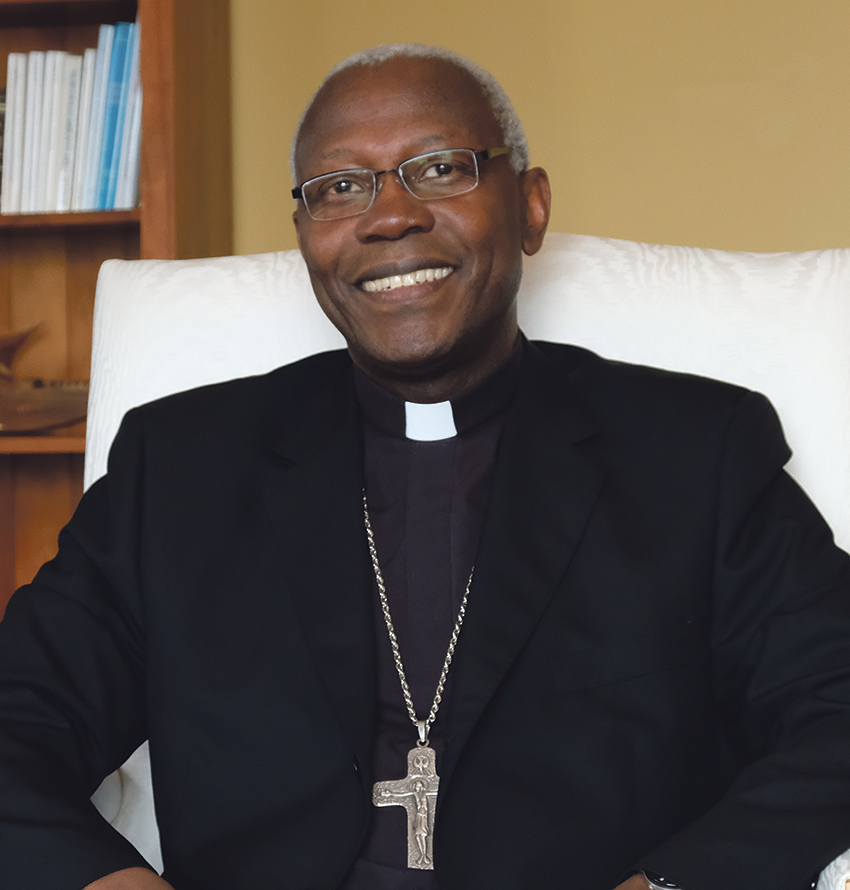WelCom December 2020
“What does it profit a man to gain the whole world, and lose his own soul?” – Matthew 16.26
Annette Scullion

‘We can do many things in our lives, but above all else everything we do should be for the salvation of the soul. This is the supreme law of the Church,’ says Archbishop Novatus Rugambwa, Apostolic Nuncio to New Zealand.
Archbishop Rugambwa arrived in New Zealand in June last year as apostolic nuncio to New Zealand. He is also apostolic delegate to some Pacific countries including Samoa, Fiji, Palau, the Marshall Islands, Kiribati, Nauru and Tonga.
The Apostolic Nunciature is a diplomatic post of the Holy See, whose representative, the apostolic nuncio, has the rank of an ambassador. The nuncio is the Pope’s representative in the country or the area he is sent. As well as acting as a diplomat, he is responsible for cementing the principle of unity and collaboration between the Holy See and the dioceses or territories under his care.
Speaking with WelCom last month, Archbishop Rugambwa emphasised the need for mission and the Church’s mandate from Christ. ‘All that he did and taught were means only to the principle end: the salvation of the souls.’
The Church’s Code of Canon Law has 1,752 laws but Archbishop Rugambwa says the most important one is the last one, which states, “the salvation of souls is the supreme law of the Church”.
‘I love the Church. I have always admired the life of missionaries who left everything to go to our far-off countries and faced many hardships out of love for God. This is what has sustained me in my vocation – we are here for others, like these missionaries before us. For example, in New Zealand and Pacific Island countries, Bishop Pompallier and St Peter Chanel left everything for their missionary work on the other side of the world. Their work and the work of those who followed, show us that the Gospel is alive and that God is proclaimed everywhere through the service of the universal Church.’
Archbishop Rugambwa said we need to ask ourselves, how can we missionise Christian values in our society today? How do we live the sacraments and how can we make people see the Word of God as relevant to them? As a missionary church we need to ask, how can we connect and dialogue with the country to live the Word of God?
‘All the baptised are called to inculcate the Gospel values in our society, live the Sacraments and help all the people to acknowledge that the Word of God and Christian charity are of paramount importance in our life and our existence.’
Pope Francis’ recent encyclical, Fratelli tutti is about our hearts and minds coming together and calls for more human fraternity and solidarity. It focuses on contemporary social and economic problems, and proposes an ideal world of fraternity in which all countries can be part of a larger human family. As a church we can contribute to effecting changes favour of all the people through fraternity and solidarity.’
Archbishop Rugambwa was born in 1957, in Bukoba near Lake Victoria, the north-west part of Tanzania. Christianity – and particularly the Catholic Church – were a strong influence in his childhood.
‘The Catholic and Lutheran missionaries helped very much especially in terms of evangelisation, education, health and with agriculture and coffee production on a larger scale to benefit communities.
‘My grandparents on both sides were the first generation to become Christians. I was brought up a Catholic and went to a Catholic primary school for the first six years of my education. I then joined a seminary school for 15-to-16 year-olds in 1972. The school taught the curriculum in our national language Swahili, and English and provided a continuity of education in the faith.
Archbishop Rugambwa went on to a major seminary to study for the priesthood. In 1981 his bishop asked him to continue studies in Rome. He returned home for pastoral experience and was ordained a priest on 6 July, 1986 for the diocese of Bukoba.
In 1988 he was admitted to the Pontifical Ecclesiastical Academy to study diplomacy and canon law, and entered the diplomatic service of the Holy See on 1 July 1991. He has served in the pontifical diplomatic missions in Panama, Republic of Congo, Pakistan, New Zealand (2000–2004) and Indonesia.
Archbishop Rugambwa was appointed undersecretary of the Holy See’s Pontifical Council for the Pastoral Care of Migrants and Itinerant People in June 2007. He was named apostolic nuncio to Angola in 2010 and to Honduras in 2015.